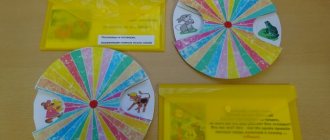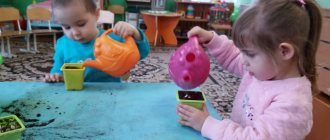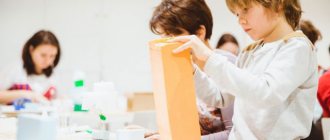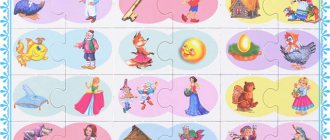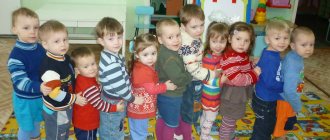Contents of self-care work
Self-care work has great educational potential. In the process of self-service, the child develops a desire for neatness, a habit of neatness, cleanliness and order, independence, the ability and desire to make efforts to achieve results.
In the preparatory group, self-care work becomes the responsibility of children. The content of work expands, educational tasks become more complicated: accuracy, a culture of activity and behavior, mutual assistance, and organization are formed.
To solve educational problems (forming in children sufficient concentration, independence, careful attitude to things, neatness), various techniques are used: positive assessment of children’s actions, their desire to follow the rules; warning of cases of oversight, negligence or reminder of the sequence of actions, constant monitoring of children’s performance of all actions.
Self-care is a constant concern for the cleanliness of the body, the order in the suit, the willingness to do everything necessary for this and to do it without external demands, out of internal need, to observe hygiene rules. It is clear that such an attitude of children towards self-care work can only be achieved through painstaking, systematic work by the kindergarten and family.
In self-care, a child is always given a specific goal, the achievement of which is understandable to the child and vitally important for him. The result that he achieves in self-care is clear and opens up certain prospects for his future activities: he gets dressed - he can go for a walk, put away his toys - he can sit down to study. While serving himself, the child exhibits certain physical and mental efforts; They become more noticeable in the child’s activities, the younger he is and the less he has the skills of dressing, washing, and eating independently.
For a 3-year-old child, each of these processes is attractive, as it provides an opportunity to show independence, satisfies his need for activity, and acts as a task that he must solve himself: put on shoes, lace them correctly, fasten buttons on a coat, fasten an elastic band. Performing these actions, the child strains his willpower, all his attention is absorbed in this process.
In the preparatory group, children acquire significant experience in a variety of actions, which reflect attention to peers and a desire to help them. Moreover, the independence of children increases: they begin to perform appropriate actions of their own free will. And the teacher’s task is to pick up and support the child’s initiative, to make others want to do the same.
The presence of sufficient skills in children allows the teacher to significantly increase the requirements for the quality of activity and its pace. Children should be able not only to quickly get dressed and put things in a certain sequence. The process of dressing and undressing should reflect the habit of neatness, careful attitude towards things, the need for cleanliness and order.
The teacher should constantly note how clothes are hung in the closet (whether the sleeves of a coat are turned out, whether a scarf is folded), whether the child made sure that wet things were put out to dry, whether he put himself in order in the dressing room or continues to straighten his clothes upon entering to the group room.
However, if a teacher notices shortcomings in appearance, he should not rush to make harsh remarks or direct instructions that can offend the child and thereby cause negativism. You can remind the child in a whisper, with a smile, which rule he forgot, or help him put himself in order, so that he feels cared for and attention.
The teacher must explain the meaning of correct actions that reflect a culture of behavior: “Children who act this way are cultured. They know how to put themselves in order, they are pleasant to look at.”
The teacher can remind children of familiar poems about Masha the Confused Man, the Absent-Minded Man from Basseynaya Street, various situations in which the hero’s sloppiness manifested itself, and laugh with them at such a sloppy person. We need to make children want to not be like him.
Children develop cultural behavior skills when surrounded by their peers. Namely, while dressing, you need to remember that your comrades are dressing nearby, not to interfere, not to cause trouble to anyone. Warn the leaning comrade so that he does not hit himself when straightening up. When passing by in an inconvenient place, turn to a friend in a polite form: “Let me pass, please.”
Older children are able to notice which of their peers need help. It is very important to create in the locker room such an atmosphere of mutual assistance and mutual respect, when children themselves offer help to a friend, ask for help themselves, eliminate the mistake made, without wasting time finding out who made it.
Children of the preparatory group have access to elementary forms of courtesy. Therefore, using situations that arise, they should be taught to be attentive, to notice which of those around them needs participation, help, support, and to act accordingly, without waiting for a request from them. There are a lot of situations for this that arise in the everyday life of a kindergarten, and they must be used to develop in children positive practical experience in actions that comply with moral standards.
The significantly increased level of skills makes it possible to increase the requirements for the pace of activity. Children's distractions should now be seen as shortcomings and composure should be persistently taught. The teacher must be extremely attentive to those children who are distracted from the task and therefore late, from the first moment they enter the locker room or get up after sleep. To encourage children to avoid delaying the dressing process, you can use the following techniques: remind them of upcoming interesting activities in the area, positively evaluate children who are efficient and focused (however, it is important that different children are given as examples).
Sometimes it happens that the whole process of dressing in a group proceeds too slowly, without the proper activity of the children. An hourglass can be used to attract attention and interest. Watch how the sand pours, tell what this hourglass shows, the time in which you need to get dressed. But this can only be done by someone who will not waste time.
Then ask the children to get dressed, without distraction, quickly, while at the same time paying attention to how much sand remains. This technique can significantly improve the organization of children and influences the formation of self-control. Of course, it should not be considered as universal, but in a number of cases it can be used.
The work of children in self-care varies, but the content and methods of managing their activities should always include the formation of skills and, on their basis, the development of independence, efficiency, a culture of activity, a culture of behavior among peers, and discipline.
Those educators who constantly make sure that in the process of self-service children show attention, care, and help do the right thing. Sometimes it happens like this: a child knows how to dress quickly and well, but does not want to help anyone with this. It is important to ensure that from a very early age children in kindergarten work not only to satisfy their personal needs for cleanliness and order, but also willingly help each other. The assessment of work activity should contain an emphasis on the child’s current achievements and what is still not working well. It must be borne in mind that objective assessment helps strengthen children’s desire to do everything themselves, the desire to work better, the ability to overcome difficulties, and achieve results.
